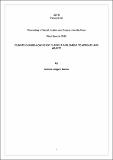| dc.contributor.author | Banda, Sosten Z | |
| dc.date.accessioned | 2020-10-15T08:07:24Z | |
| dc.date.available | 2020-10-15T08:07:24Z | |
| dc.date.issued | 2012 | |
| dc.identifier.citation | Banda, S. (2012) | en |
| dc.identifier.uri | https://repository.jctr.org.zm/handle/20.500.14274/126 | |
| dc.description | Climate change has been acknowledged as a real challenge in Zambia by both practitioner and farming communities for example through experiencing the full brunt of floods and droughts in some districts. One area of opportunity for policy implementation would be to link sustainable agriculture policies to the Farmer Input Support Programme (FISP) wherein the beneficiaries should practice conservation agriculture in using the inputs as a way of mitigation. To do this, Government would have to redesign the entire extension service with the skills and competencies to teach farmers about conservation agriculture. Similarly, sustainable agriculture systems can place people on better food security status if applied properly. The use of sustainable agriculture as a strategy for climate change adaptation in different areas should recognize that even if the principles and practices are uniform, their application must be location specific | en |
| dc.description.abstract | Climate change is not only an environmental injustice, but a humanitarian and development emergency of global proportions. It is poised to significantly impact food security, livelihoods, health and other basic services. Those affected most will be the poorest and most vulnerable economies, which have the least cause to the problem. It is therefore not surprising that climate change has become a subject of local, national, regional and international importance, it is scientifically accepted that it has already began to have negative impacts on the global environment. Studies on the economic impact of climate change have been conducted in many African countries. These inquiries, are seeking to establish the present magnitude of the impact of climate change and the scale of adaptation measures required to address CC’s negative impacts. A recent study by Stockholm Environment Institute (SEI) indicated that specifically the Southern Africa region (including Zambia) is responsible for a tiny percentage of the world’s carbon emissions but is likely to one of the worst effected area. The United Nations Framework on Climate Change (UNFCCC), to which Zambia is a party has met for the past 17 years and has still not agreed to binding reduction commitments or to a process that will effectively combat climate change. | en |
| dc.language.iso | en | en |
| dc.publisher | Jesuit Centre for Theological Reflection | en |
| dc.rights | Attribution-NonCommercial-ShareAlike 3.0 United States | * |
| dc.rights.uri | http://creativecommons.org/licenses/by-nc-sa/3.0/us/ | * |
| dc.subject | Climate Change | en |
| dc.subject | Sustainable Agriculture | en |
| dc.title | Climate Change-How Ready is Africa and Zambia to Mitigate and Adapt? | en |
| dc.type | Briefing | en |

